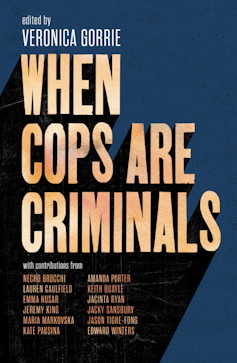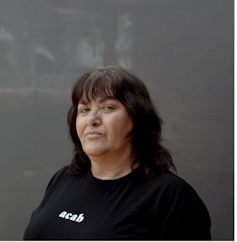Edited by former Queensland police officer and Gunai/Kurnai woman Veronica Gorrie, the title of When Cops are Criminals may suggest a book covering high-profile, or unusual, officer-involved crimes. But this collection does not focus on the extraordinary.
As Gorrie explains, her reason for putting the book together was
to highlight the harmful behaviours committed by police every single day, and, more importantly, the impact this has on their victims.
Gorrie’s previous award-winning book, Black and Blue: a memoir of racism and resilience, was an account of her time as a police officer between 2001 and 2011. In this new edited collection, 12 authors – survivors, campaigners, practitioners, and academics – share their own stories (or those of others to which they are privy).
Review: When Cops are Criminals – edited by Veronica Gorrie (Scribe)
The predominant theme of When Cops are Criminals is that police and policing in Australia are systemically corrupt and abusive. Experiences of police misconduct and criminal behaviours – from racial profiling to sexual assault and family violence – are shown to be normalised, multi-jurisdictional, and persistent.
Each chapter addresses the enduring and systemic racism, homophobia, misogyny, institutionalised toxicity, and dysfunction that enable and excuse individual and collective abuses of policing power. The book also highlights the limitations of mechanisms designed to ensure effective police scrutiny and meaningful accountability.
The chapters largely focus on individual experiences, through deeply personal narratives and victim-survivor vignettes. These experiences are not situated within broader statistical analyses or tested empirical evidence, in terms of the number, type, or location of police involved in alleged abusive, corrupt, or criminal behaviours.
Nor, given the nature and purpose of the collection, are specific responses put forward by the various police forces or the bodies that oversee them.
However, a wealth of research confirms the enduring nature, across multiple police jurisdictions in Australia, of behaviour such as
racial profiling, police perpetrated family violence, differential treatment of the LGBTQI+ community,
discriminatory treatment of young people, and problematic handling of complaints. Victoria’s Independent Broad-based Anti-Corruption Commission (IBAC) has highlighted what it refers to as “cover up” behaviours that can mask police misconduct.
In her introduction, Gorrie notes:
Police are cruel towards many marginalised groups […] Police use excessive force […] Police are committing crimes, while off duty, against their partners, wives, family, and children [… and] Cops are known to prey on other cops.
Personal vignettes
Many of the book’s contributors are First Nations people, others represent groups whose interactions with police are similarly affected by sometimes intersecting aspects of their identity: their sexuality, age, gender, or as victim-survivors of family violence. For some authors, this is the first time they have openly shared their experiences.
The book begins with legal academic Amanda Porter’s “snapshot of the genocidal dimensions of Australian policing.” From its convict and colonial foundations, Porter highlights the deep-rooted, structural underpinnings of policing in Australia: racism, sexism, homophobia, and violence. An absence of meaningful scrutiny and too little accountability make it almost impossible to discern an accurate picture of Australian police behaviours, she argues.
A number of personal vignettes then unfold.
Edward Winters describes a series of events in 1990s Melbourne, as a 20-year-old Koori man working for a legal service. After witnessing two police officers beating up a white man, Winters explains how he believes the same officers tried to intimidate him into silence. He was, he writes, detained at a police watch-house, where he witnessed further violence, before being transferred to the notorious Pentridge Prison and subjected to a public and invasive strip search.

Eighteen-year old Aboriginal woman Jacky Sansbury shares troubling experiences involving police in South Australia, including the “hundreds of times” she has been harassed and abused. Sansbury recalls, as an eleven-year-old, hiding under a blanket with her siblings before “hearing footsteps coming towards the room” and an officer pointing a gun at her. She later reveals how a cousin was left with serious scarring after being held down by officers on a hot road surface. In calling for greater police accountability, Sansbury maintains “the system we rely on to protect and serve us is corrupt.”
Jason Tighe-Fong honours his friend Billy, sharing their experiences in Sydney in the late 1980s and early 1990s. Officers, he writes, would routinely stop, abuse, and beat young Indigenous men who were simply walking home or just going about their business.
As a gay Aboriginal teen in Sydney in the early 2000s, Keith Quayle was used to running from police. In his chapter, Quayle describes the violence (including sexual abuse and public strip searches) meted out by officers, and the fear and hopelessness he felt from the profound imbalance of power.
… I wonder what that feeling might be in a different world. If those cops weren’t looking for drugs on Black kids, but for paedophilia on [sic] respectable white men. What would I feel now if we’d been rescued rather than punished?
While some of these accounts date back a number of decades, there is little evidence key issues raised have seen any real improvement. Earlier this year, law academic Dr Hannah McGlade described “a failure of governments to ensure accountability and reform of racist policing systems and structures” in Australia.
In another chapter, Necho Brocchi, a Spanish-Italian social/policy worker, and a trans woman, reveals experiences of racism and transphobia. She shares the stories of three trans and gender-diverse people in Queensland – Qtt, Tyty, and Princess – who she came to know over the last few years.
In one example, Qtt tells Brocchi of being choked and “bashed” by staff while in youth detention. On another occasion, she writes, a police officer “kneed her in the face” at a watch-house, and she also tells of being sexually assaulted in custody. The problematic policing of trans and gender-diverse people is not unique to Queensland.
Police perpetrated family violence
Family violence victim-survivor Jacinta Ryan recounts the physical, emotional, and financial abuse perpetrated by her then NSW police sergeant partner. She condemns a toxic police culture that enabled and excused his violence. It is, she writes, “an environment where disrespecting your spouse and family is common, and poor or illegal behaviour is often ignored.” Ryan’s former partner was eventually prosecuted and, in 2021, found guilty on all charges. A subsequent appeal was unsuccessful.
Interspersed with victim-survivor vignettes, family violence worker and community lawyer Lauren Caulfield navigates what she refers to as the “cascading intergenerational effects” of policing and carceral responses to family violence. She highlights the particular challenges for victims of police-perpetrated family violence, including the embedded cultures of police impunity, conflicts of interest, failures to respond to reports of such violence, and inadequate mechanisms to investigate complaints.
Research suggests police are as likely as anyone else to be family violence perpetrators. However, Caulfield reveals that, in 2021, only 15 NSW officers were charged with family violence offences – a charge rate of 0.08%. This compares with a rate of 0.42% for the general population.
Similar issues are evident in other jurisdictions, including Victoria and Queensland. As Caulfield concludes: “…carrying the badge continues to shield and excuse officers who perpetrate violence.”
In sharing her experiences with The Policeman (an ex-NSW cop turned private investigator), former federal MP Emma Husar refers to a “street angel, house devil”. Too often, she suggests, this duality of public and private faces ensures the victim is vilified and presumed to be lying, whereas the police officer perpetrator is defended and supported. The Policeman has not been prosecuted in relation to the experiences described in this chapter. The Conversation does not suggest The Policeman is guilty of any criminal acts.
Lawyer Jeremy King recounts events relating to a 2019 Victoria Police raid on the Hares & Hyena Bookshop in Fitzroy, Melbourne. He describes Victoria’s internal and external police accountability mechanisms as flawed and dysfunctional. A key concern is that police are asked to handle the vast majority of complaints received about their own officers. King directs particular ire towards IBAC, which largely exonerated the officers involved in the 2019 raid. In 2023, IBAC received 1914 complaints about police, but initiated only 23 investigations.
The collection closes with Kate Pausina, a former Queensland Police officer with 23 years service, sharing the mistreatment she experienced after raising concerns about potential police misconduct. She situates much of this within institutionalised sexism and racism, enabled by a “traditionally white, male, hypermasculine culture.”
Pockets of hope
When Cops are Criminals spans multiple decades, jurisdictions, and policing institutions. Across these varied domains, the most obvious constant from the experiences shared is the normalisation of abuse, and the absence of meaningful accountability.

The book challenges the pervasive, reductive notion that police officers who abuse or are guilty of misconduct are proverbial, and largely atypical, “bad apples”.
It shows the impact of what Caulfield terms “cascading intergenerational effects” on historically over-criminalised and abused populations – particularly First Nations people, migrant and refugee communities, and LGBTQI+ people.
There are small pockets of hope within the collection. For example, the individual officers supporting Ryan in her efforts to hold her former partner accountable for his family violence; and Brocchi’s acknowledgement of the Queensland organisation Sisters Inside, which supports incarcerated women and girls. Her message is “justice is a community act.”
These sentiments are, understandably, often lost in the breadth and depth of the experiences depicted.
Still, When Cops are Criminals emphasises the power of individual and collective voices – embodied by Sansbury’s call to action.
I will not be silenced; I will no longer live in fear. My one voice speaks for many.
This book is accessible, confronting, heart-breaking and anger inducing. The details and experiences may be shocking but, for all too many readers, they are unlikely to be surprising.
Clare Farmer has received research funding from the Queensland Department of Justice and Attorney-General; the Department of Justice and Community Safety in Victoria; and the Western Australia Police Force. She is a community member of Victoria's Adult Parole Board.
This article was originally published on The Conversation. Read the original article.







